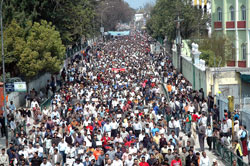|
|
The thousands who converged in Basantapur on Tuesday this week did not come to support a specific cause. They came to express their anguish, frustration, and rejection of growing Maoist atrocities against people in business.
After the April Uprising and legitimisation of the Maoists, the former rebels' extortion, kidnapping, and threats have not ceased. This week, after two businesspeople were kidnapped and one beaten, people said enough is enough and took to the streets. It's unfortunate that a prime minister who has the time to meet heads of bilateral agencies that pledge a measly one million dollars found it difficult to make time to listen to the grievances of people who have invested billions-and their lives-in Nepal.
The Maoists have always targeted entrepreneurs, because they view business as the opposition, and as elite who exploit 'the people'. The fact that Pushpa Kamal Dahal still associates businesspeople with the king and regressive forces is proof of the comrades' distrust of the private sector. Meanwhile, he continues to talk in riddles-no one can explain the phrase "national capitalist".
There's a simple way out of this muddle, if only the Maoists could see it. Governments-such as the one they are about to join-can only run on revenue. This in turn can be either received through businesses or by sashaying on the ramps for the donor community. The government can only in theory earn revenue by conducting business itself. If the Maoists want to create more jobs for their disgruntled cadres or provide a longer-term economic solution for Nepal's poverty, they will have to trust the private sector.
The Finance Minister was right to say that the Maoists' conduct has never been like that of a group on the verge of joining the government. The comrades are mistaken if they think they can get away with a Bihar-UP-style two-pronged approach: ruling legitimately and extorting illegitimately. People have given them the benefit of the doubt for the last ten months. These same people and civil society could corner a king who had the full military behind him. If they wanted, they could do the same to an unruly mob that has given up most of its arms. The Maoists' over-confidence in the tarai cost them dearly. They really should think about whether they also want to lose the capital, where they have got used to living the high life.
Finally, group differences have been put aside in the private sector. The Beed hopes this bonding continues in talks with trade unions to foster an acceptable labour regime that will boost enterprise creation and rebuild trust between employers and employees.The people bandying around catchphrases like federalism, inclusion, and social equity can't really explain what actions needed to be taken to achieve these goals. The problem and solution on the economic front are much clearer-there is poverty across caste, ethnicity, gender, creed, and geography. Any future Nepal must create more economic opportunities. For this we need the private sector. Yes, right frameworks of governance are needed to regulate enterprises. If the government finds itself unable to regulate, it cannot cover that up by simply taking over business.
The events of this week give the Maoist a chance to introspect. They should take it, instead of just going around the districts making speeches like the failed monarch. Pluralistic democracy is about building rational supporters, not luring sycophants. For virtually all the parties, it's now or never.




